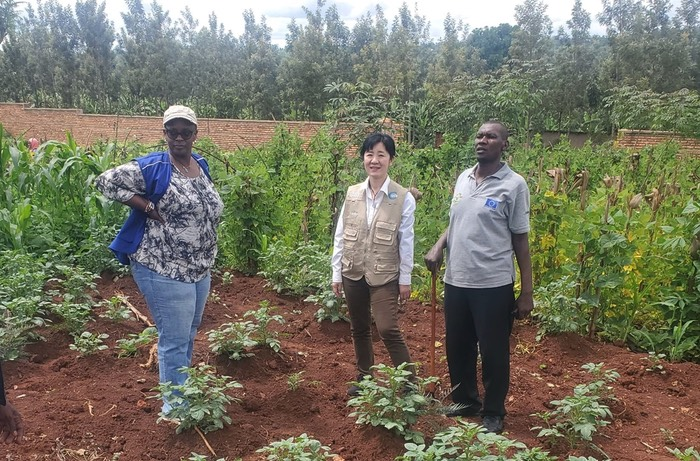
Representatives from the EU and IUCN visited several agroforestry intervention sites. Photo by Lewis Ndayisaba
By Jean Claude HABIMANA
In a breakthrough moment for climate-resilient agriculture and building resilient and sustainable agri-food systems, as stated in Rwanda’s agriculture strategic plan (PSTA5), the International Union for Conservation of Nature (IUCN), in partnership with the European Union Delegation to Rwanda and CIFOR-ICRAF, awarded merit certificates to 130 agroforestry farmer champions across Rwanda’s Eastern Province. The recognition ceremony took place during a joint field mission to Kirehe and Gatsibo districts from April 22 to 24, 2025.
The visit marked the culmination of achievements under the DeSIRA Agroforestry Research Project, formally titled “Improving resilience of farmers’ livelihoods to climate change through innovative, research-proven climate-smart agroforestry and efficient use of tree resources in the Eastern Province and peri-urban areas of Kigali City.” Funded by the European Union, the project is implemented by IUCN in partnership with CIFOR-ICRAF and Enabel, and supported by Ghent University, KU Leuven, and the University of Rwanda.
Each champion was awarded a merit certificate in recognition of their outstanding contribution to EU-Desira agroforestry research project. Photo by Lewis Nday
This project aims to restore degraded agricultural landscapes, enhance rural livelihoods, and promote sustainable biomass energy use through community-driven agroforestry practices. By integrating trees into farming systems and training farmers in crop-tree integration, from nursery establishment to tree planting and sustainable land management, the initiative has equipped communities with the tools to face climate change head-on.
“These champions are not just planting trees; they are cultivating resilience,” said Ms. Kaori Yasuda, IUCN Rwanda Country Representative. “Their efforts are vital to restoring land health and advancing Rwanda’s vision of sustainable development.”
More than 40,000 agroforestry trees and 8,160 fruit and macadamia trees have been planted in the project areas from four districts. A total of 47 trained farmers (27 from Kirehe and 20 from Gatsibo) and 12 community champions (8 from Gatsibo and 4 from Kirehe) received certificates in appreciation of their leadership and commitment. The DESIRA project interventions also trained a similar number of farmers in Nyagatare and Gasabo districts.
“Science-based solutions, when placed in the hands of local actors, lead to lasting impact,” noted Dr. Athanase Mukuralinda, CIFOR-ICRAF Country Director. “The success here is proof that community-led restoration works.”
During the visit, EU delegates and project partners toured macadamia orchards and fruit tree plots to assess survival rates and growth progress. The trees planted in November 2024 were found to be thriving, with strong community ownership and a commitment to long-term maintenance and ownership. “We are now extending agroforestry practices to other sectors,” said one farmer. “These trees will help us in the years to come.”
Finally, local farmers expressed enthusiasm for the benefits of agroforestry and requested further capacity-building, particularly in fruit tree planting and maintenance, to generate income and improve nutrition.
As the project approaches its completion, the joint mission reaffirmed the value of inclusive, community-driven approaches to ecological restoration. Through its landscape-wide research and investment in farmer capacity, the DeSIRA Agroforestry Research Project is not only restoring ecosystems but also planting the seeds of resilience for future generations. Moreover, the European Union commended the project’s results and urged IUCN to continue ensuring sustainability beyond the project. (End)
